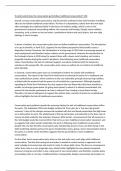To what extent does the conservative party follow traditional conservatism? (30)
Overall, current conservative party policy, and the promise outlined in their 2019 election manifesto
often do not follow traditional conservatism. The fear of a dependency culture from the new-right
often outweighs the traditional belief in the theory of noblesse oblige, which is seen in the
government’s proposals surrounding welfare, the economy and housing. Despite some tradition
remaining, such as views on law and order, constitutional reform and social justice, the new-right
ideology is much stronger.
In terms of welfare, the conservative party does not follow traditional conservatism. The introduction
of a cap on benefits, in April 2013, supports the neo-liberal perspective that benefits create a
dependent society. Moreover, the introduction of a living wage in 2016 tries to encourage people to
seek employment and therefore reduce reliance on the government. However the introduction of
the furlough scheme in 2020 aimed to support those with a lower social standing, and create a
pragmatic solution during the covid 19 pandemic, thus following more traditional conservative
values. Nevertheless, the lack of continued support, and when combined with the temporary
assistance with energy bills, the conservative party views on welfare do not conform to traditional
party ideology.
In contrast, conservative party views on constitutional reform do comply with traditional
conservatism. The repeal of the Fixed-Term Parliament Act showed the desire for a traditional and
more authoritarian system, which conforms to the one-nationalist principle of preserving tradition,
as historically the monarch had the power to call and dismiss a government. Although arguably,
repealing the Fixed-Term Parliament Act also supports the neo-liberal idea that there should be a
smaller yet stronger government. By giving more power to where it is already concentrated, the
amount of intervention parliament can have is reduced, thus creating a more liberal society.
Therefore, the lack of willingness to support the welfare state, and lack of desire for constitutional
reform highlights the lack of traditional conservatism.
Conservative party policies towards the economy display the lack of traditional conservatism within
the party. The September 2022 mini-budget outlined Liz Truss’ plan for a ‘low tax, high growth
economy’. Many of the changes announced complied with the neo-liberal perspective that high taxes
are a disincentive to work. The abolishment of the top tax bracket, and reduction in the basic rate of
income tax both underline this principle. However, Rishi Sunak’s announcement that all measures in
the mini-budget would be reversed infers that he has a more traditional conservative viewpoint, and
so suggests that under Sunak’s leadership, the party is following more traditional conservatism.
Despite this, the fact that the conservative party membership chose Li Truss over Rishi Sunak in the
2022 leadership election portrays the party membership’s views, giving a more representative look at
the party as a whole, which therefore suggests that the party follows a more traditional
conservatism.
On the other hand, conservative party views on law and order very much align with traditional
conservatism. The idea that strong law and order is needed to control society is apparent in the
party’s pledge to increase stop and search in order to reduce knife crime. The focus on consequence
rather than cause is a very pragmatic view, which further highlights the one-national viewpoint.
However strong law and order is also a large part of neo-conservatism, and therefore resolute policy
surrounding crime is not only a traditional ideal. Consequently, despite conservative party policy on




